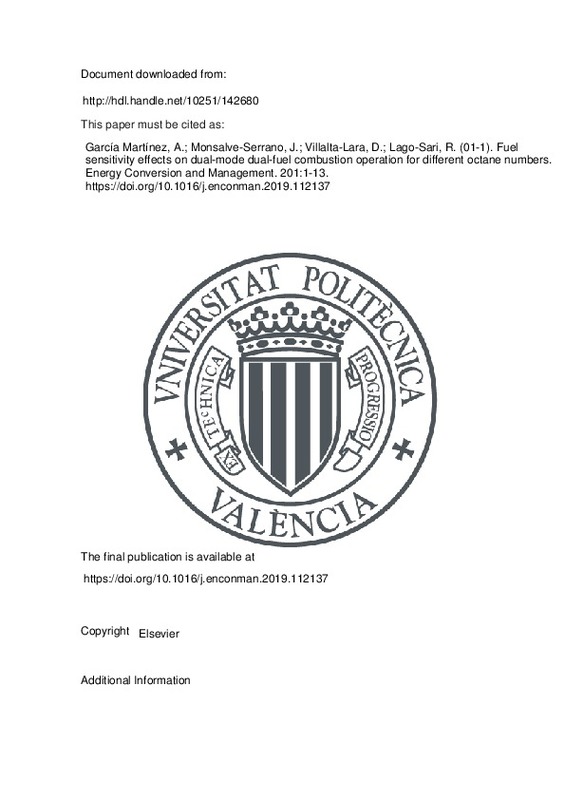JavaScript is disabled for your browser. Some features of this site may not work without it.
Buscar en RiuNet
Listar
Mi cuenta
Estadísticas
Ayuda RiuNet
Admin. UPV
Fuel sensitivity effects on dual-mode dual-fuel combustion operation for different octane numbers
Mostrar el registro sencillo del ítem
Ficheros en el ítem
| dc.contributor.author | García Martínez, Antonio
|
es_ES |
| dc.contributor.author | Monsalve-Serrano, Javier
|
es_ES |
| dc.contributor.author | Villalta-Lara, David
|
es_ES |
| dc.contributor.author | Lago-Sari, Rafael
|
es_ES |
| dc.date.accessioned | 2020-05-07T05:57:05Z | |
| dc.date.available | 2020-05-07T05:57:05Z | |
| dc.date.issued | 2019-12-01 | es_ES |
| dc.identifier.issn | 0196-8904 | es_ES |
| dc.identifier.uri | http://hdl.handle.net/10251/142680 | |
| dc.description.abstract | [EN] The dual-mode dual-fuel combustion is a promising combustion concept to achieve the required emissions and carbon dioxide reductions imposed by the next emissions standards. Nonetheless, since the combustion concept relies on the reactivity of two different fuels (diesel and gasoline), the fuel formulation requirements are stricter. This work investigates the effects of the low reactivity fuel sensitivity for different octane numbers at different operating conditions representative of the combustion regimes found inside the dual-mode dual-fuel engine map. For this, experimental evaluations were performed using fuels with research octane number 92.5 and 80 and different sensitivities (0, 5 and the maximum one achievable for each fuel). The combustion development was assessed by means of the heat release rate characterization. Moreover, numerical simulations in a constant volume homogeneous reactor were used to explore and understand the impact of the different fuels on the ignition delay time. The results suggest that the sensitivity increase affects the different research octane number fuels in a different way. For the fuel with research octane number 92.5, the sensitivity variation increases the experimental ignition delay, impairing the combustion process and increasing the fuel consumption. In the case of the fuel with research octane number 80, the sensitivity increase does not affect the combustion development. This was justified by the numerical investigation, which points to a wider temperature range where the sensitivity does not affect the final ignition delay for research octane number 80. Moreover, generally, the ignition delay times for research octane number 80 considering the experimental gasoline fraction used are half than those of research octane number 92.5. At full load conditions, the trend is inverted, where the experimental ignition delay for research octane number 80 is affected by the sensitivity whilst research octane number 92.5 presents only modifications after the combustion start. | es_ES |
| dc.description.sponsorship | The authors thanks ARAMCO Overseas Company and VOLVO Group Trucks Technology for supporting this research. The authors also acknowledge FEDER and Spanish Ministerio de Economía y Competitividad for partially supporting this research through TRANCO project (TRA2017-87694-R), and the Universitat Politècnica de València for partially supporting this research through Convocatoria de ayudas a Primeros Proyectos de Investigación (PAID-06-18). | es_ES |
| dc.language | Inglés | es_ES |
| dc.publisher | Elsevier | es_ES |
| dc.relation.ispartof | Energy Conversion and Management | es_ES |
| dc.rights | Reserva de todos los derechos | es_ES |
| dc.subject | Dual-fuel combustion | es_ES |
| dc.subject | Fuel sensitivity | es_ES |
| dc.subject | Octane number | es_ES |
| dc.subject | Ignition delay | es_ES |
| dc.subject | Reactivity-controlled compression ignition | es_ES |
| dc.subject.classification | MAQUINAS Y MOTORES TERMICOS | es_ES |
| dc.title | Fuel sensitivity effects on dual-mode dual-fuel combustion operation for different octane numbers | es_ES |
| dc.type | Artículo | es_ES |
| dc.identifier.doi | 10.1016/j.enconman.2019.112137 | es_ES |
| dc.relation.projectID | info:eu-repo/grantAgreement/UPV//PAID-06-18/ | es_ES |
| dc.relation.projectID | info:eu-repo/grantAgreement/AEI/Plan Estatal de Investigación Científica y Técnica y de Innovación 2013-2016/TRA2017-87694-R/ES/REDUCCION DE CO2 EN EL TRANSPORTE MEDIANTE LA INYECCION DIRECTA DUAL-FUEL DE BIOCOMBUSTIBLES DE SEGUNDA GENERACION/ | es_ES |
| dc.relation.projectID | info:eu-repo/grantAgreement/UPV//SP20180148/ | es_ES |
| dc.rights.accessRights | Abierto | es_ES |
| dc.contributor.affiliation | Universitat Politècnica de València. Departamento de Máquinas y Motores Térmicos - Departament de Màquines i Motors Tèrmics | es_ES |
| dc.description.bibliographicCitation | García Martínez, A.; Monsalve-Serrano, J.; Villalta-Lara, D.; Lago-Sari, R. (2019). Fuel sensitivity effects on dual-mode dual-fuel combustion operation for different octane numbers. Energy Conversion and Management. 201:1-13. https://doi.org/10.1016/j.enconman.2019.112137 | es_ES |
| dc.description.accrualMethod | S | es_ES |
| dc.relation.publisherversion | https://doi.org/10.1016/j.enconman.2019.112137 | es_ES |
| dc.description.upvformatpinicio | 1 | es_ES |
| dc.description.upvformatpfin | 13 | es_ES |
| dc.type.version | info:eu-repo/semantics/publishedVersion | es_ES |
| dc.description.volume | 201 | es_ES |
| dc.relation.pasarela | S\394630 | es_ES |
| dc.contributor.funder | ARAMCO Overseas Company | es_ES |
| dc.contributor.funder | Volvo Group Trucks Technology | es_ES |
| dc.contributor.funder | Agencia Estatal de Investigación | es_ES |
| dc.contributor.funder | European Regional Development Fund | es_ES |
| dc.contributor.funder | Universitat Politècnica de València | es_ES |







![[Cerrado]](/themes/UPV/images/candado.png)

